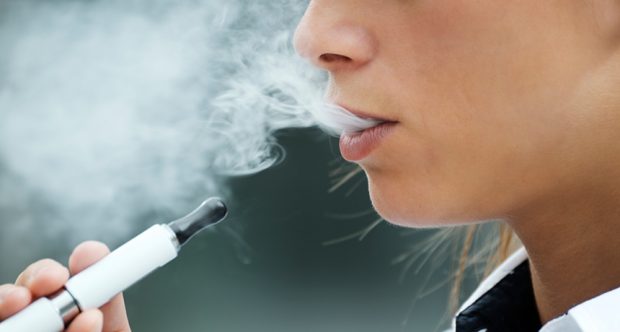
E-cigarette use may increase heart disease risk: Study
Team Udayavani, May 28, 2019, 12:23 PM IST

Boston: The flavouring liquid used in electronic cigarettes may increase the risk of cardiovascular disease when inhaled, a Stanford study warns.
Scientists investigated the effect of the e-liquids on cells called endothelial cells that line the interior of blood vessels.
The study, published in the Journal of the American College of Cardiology, found that endothelial cells exposed to the e-liquids — or to blood collected from e-cigarette users shortly after vaping — are less viable and exhibit significantly increased levels of molecules implicated in DNA damage and cell death.
The cells are also less able to form new vascular tubes and to migrate and participate in wound healing.
The severity of the damage, aspects of which occur even in the absence of nicotine, varies among popular flavours, the researchers said. Cinnamon and menthol were found to be particularly harmful.
“Until now, we had no data about how these e-liquids affect human endothelial cells,” said Joseph Wu, director of the Stanford University in the US.
“This study clearly shows that e-cigarettes are not a safe alternative to traditional cigarettes,” Wu said.
“When we exposed the cells to six different flavours of e-liquid with varying levels of nicotine, we saw significant damage. The cells were less viable in culture, and they began to exhibit multiple symptoms of dysfunction,” he added.
The researchers studied human endothelial cells generated in the laboratory from what are called induced pluripotent stem cells, or iPS cells.
Human iPS cells can become many different cell types, and they provide an ideal way for researchers to closely study cells that would be difficult to isolate directly from a patient.
Endothelial cells line the interior surface of blood vessels and play a critical role in heart and cardiovascular health.
“We found the e-liquids caused changes in the endothelial cells that are closely related to those seen during the development of cardiovascular disease,” said Won Hee Lee, a postdoctoral scholar at Stanford.
The researchers investigated the effect of six different popular e-liquid flavours — fruit, tobacco, sweet tobacco with caramel and vanilla, sweet butterscotch, cinnamon, and menthol — with nicotine levels of 0, 6, and 18 milligrams per millilitre on endothelial cells derived from human iPS cells.
They found that while several of the liquids were moderately toxic to the endothelial cells, the cinnamon- and menthol-flavoured e-liquids significantly decreased the viability of the cells in culture even in the absence of nicotine.
Exposure to the e-liquids also increased the relative levels of reactive oxygen species — molecules that can cause DNA damage — and the levels of molecules associated with programmed cell death.
The researchers also found that exposure to the cinnamon and menthol flavoured e-liquids significantly disrupted the ability of the cultured cells to form capillary-like tubular structures associated with the growth of new blood vessels.
The e-liquid flavoured with caramel and vanilla also disrupted growth, but not as severely.
The cells exposed to cinnamon flavour and caramel and vanilla flavours exhibited an increased uptake of low-density lipoproteins and lipids — processes commonly associated with inflammation and endothelial dysfunction — and a reduction in their ability to migrate to heal wounds or scratches.
Some of the effects of exposure to the various e-liquids were dependent on the nicotine concentration, but others, like cellular migration and decreases in cell viability, were independent of nicotine, suggesting a combined effect of nicotine concentrations and flavouring components.
Udayavani is now on Telegram. Click here to join our channel and stay updated with the latest news.
Top News

Related Articles More

Plant-based meat alternatives linked to increased risk of depression in vegetarians, study finds

Lung transplant at right time only cure for idiopathic pulmonary fibrosis that killed Ustad Zakir Hussain

ICMR sets up India’s first diabetes biobank in Chennai

AI Meets Health: The Rise of Smart Fitness Solutions

New study links paracetamol to side effects in digestive tract, heart, kidneys among older adults
MUST WATCH
Latest Additions

Assembly clears Mysuru Development Authority Bill

Blocked 18 OTT platforms for publishing obscene, vulgar content: Govt

Boy critically injured after tree branch falls on him in Bengaluru

Congress claims party worker ‘died due to tear gas smoke’ during protest in Assam

Four dead in road accident in Kolar
Thanks for visiting Udayavani
You seem to have an Ad Blocker on.
To continue reading, please turn it off or whitelist Udayavani.




















